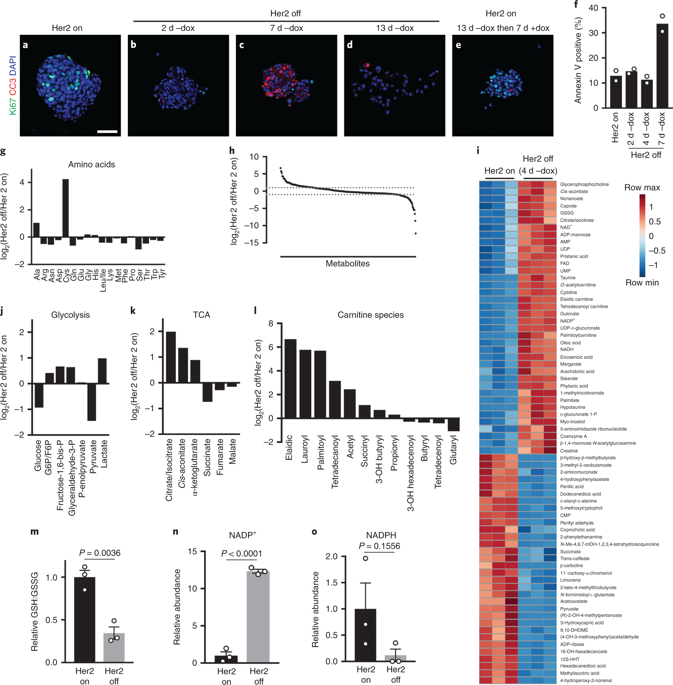Nature Metabolism ( IF 18.9 ) Pub Date : 2020-04-20 , DOI: 10.1038/s42255-020-0191-z Douglas B Fox 1 , Nina Marie G Garcia 1 , Brock J McKinney 1 , Ryan Lupo 1 , Laura C Noteware 1 , Rachel Newcomb 1 , Juan Liu 1 , Jason W Locasale 1 , Matthew D Hirschey 1, 2, 3 , James V Alvarez 1

|
The survival and recurrence of dormant tumour cells following therapy is a leading cause of death in patients with cancer. The metabolic properties of these cells are likely to be distinct from those of rapidly growing tumours. Here we show that Her2 downregulation in breast cancer cells promotes changes in cellular metabolism, culminating in oxidative stress and compensatory upregulation of the antioxidant transcription factor NRF2. NRF2 is activated during dormancy and in recurrent tumours in animal models and patients with breast cancer with poor prognosis. Constitutive activation of NRF2 accelerates recurrence, whereas suppression of NRF2 impairs it. In recurrent tumours, NRF2 signalling induces a transcriptional metabolic reprogramming to re-establish redox homeostasis and upregulate de novo nucleotide synthesis. The NRF2-driven metabolic state renders recurrent tumour cells sensitive to glutaminase inhibition, which prevents reactivation of dormant tumour cells in vitro, suggesting that NRF2-high dormant and recurrent tumours may be targeted. These data provide evidence that NRF2-driven metabolic reprogramming promotes the recurrence of dormant breast cancer.
中文翻译:

NRF2 激活通过调节氧化还原和核苷酸代谢促进休眠肿瘤细胞的复发。
治疗后休眠肿瘤细胞的存活和复发是癌症患者死亡的主要原因。这些细胞的代谢特性可能与快速生长的肿瘤不同。在这里,我们发现乳腺癌细胞中 Her2 的下调会促进细胞代谢的变化,最终导致氧化应激和抗氧化转录因子 NRF2 的代偿性上调。 NRF2 在动物模型和预后不良的乳腺癌患者的休眠期间和复发性肿瘤中被激活。 NRF2 的组成性激活会加速复发,而抑制 NRF2 则会损害复发。在复发性肿瘤中,NRF2 信号传导诱导转录代谢重编程,以重新建立氧化还原稳态并上调从头核苷酸合成。 NRF2驱动的代谢状态使复发性肿瘤细胞对谷氨酰胺酶抑制敏感,从而防止休眠肿瘤细胞在体外重新激活,这表明NRF2高的休眠和复发性肿瘤可能是目标。这些数据证明 NRF2 驱动的代谢重编程会促进休眠乳腺癌的复发。











































 京公网安备 11010802027423号
京公网安备 11010802027423号